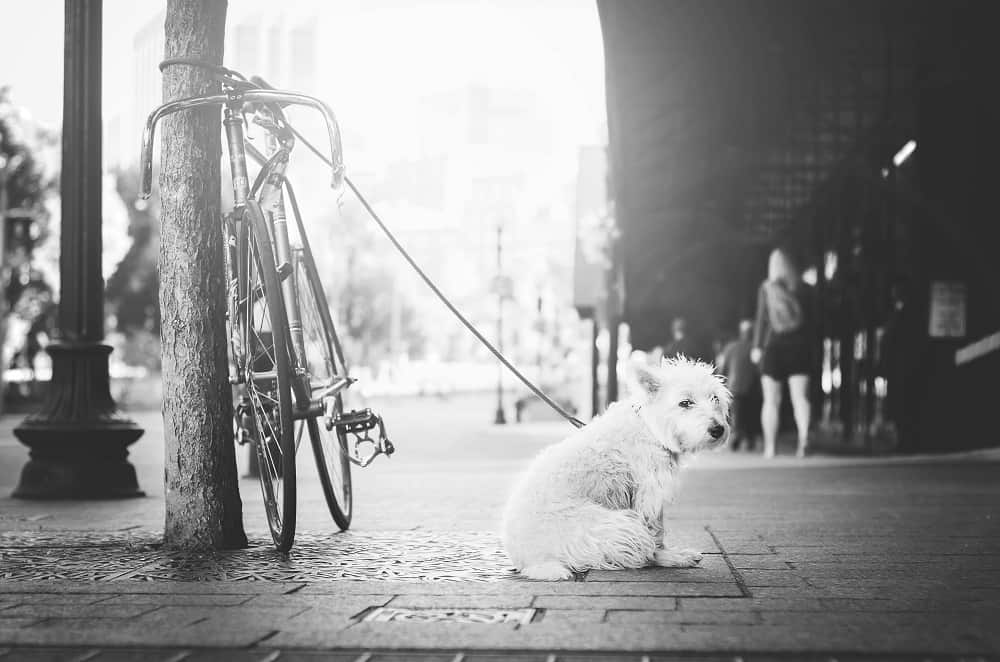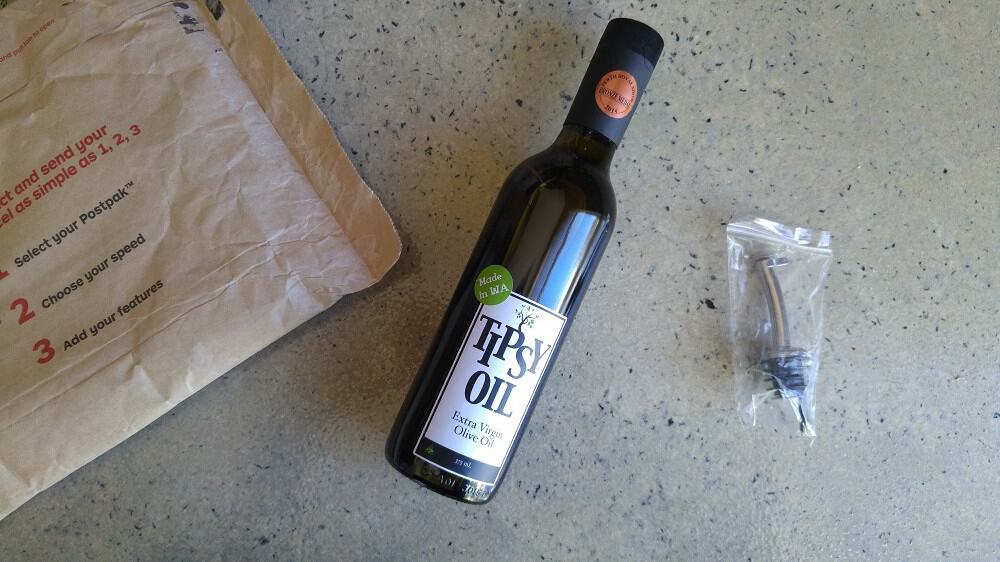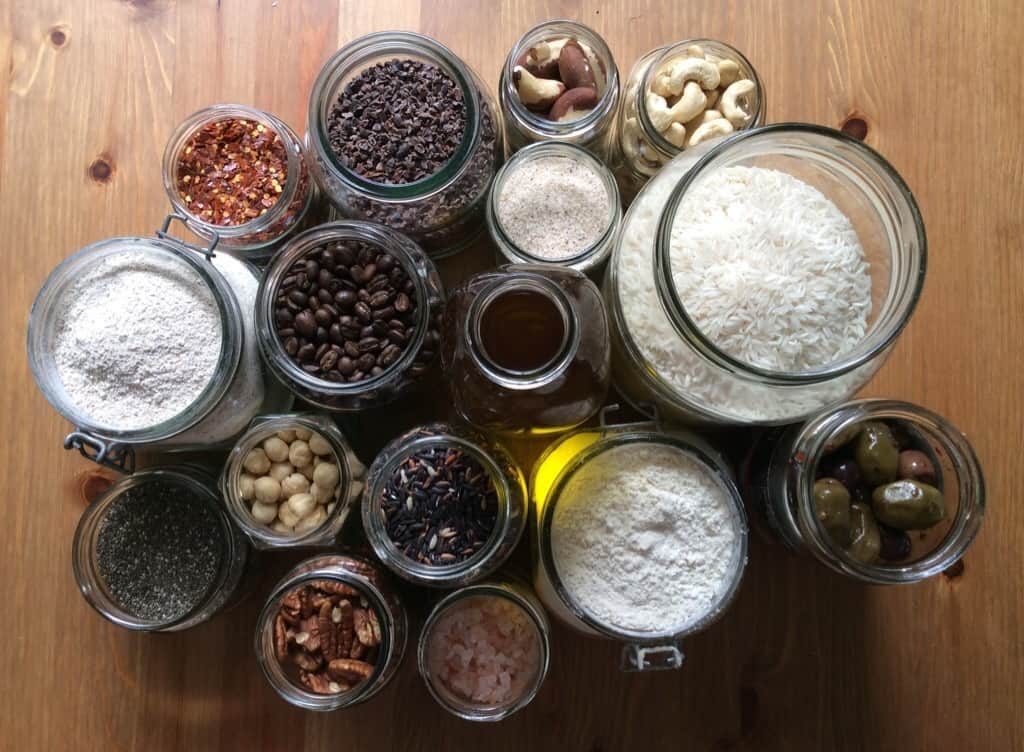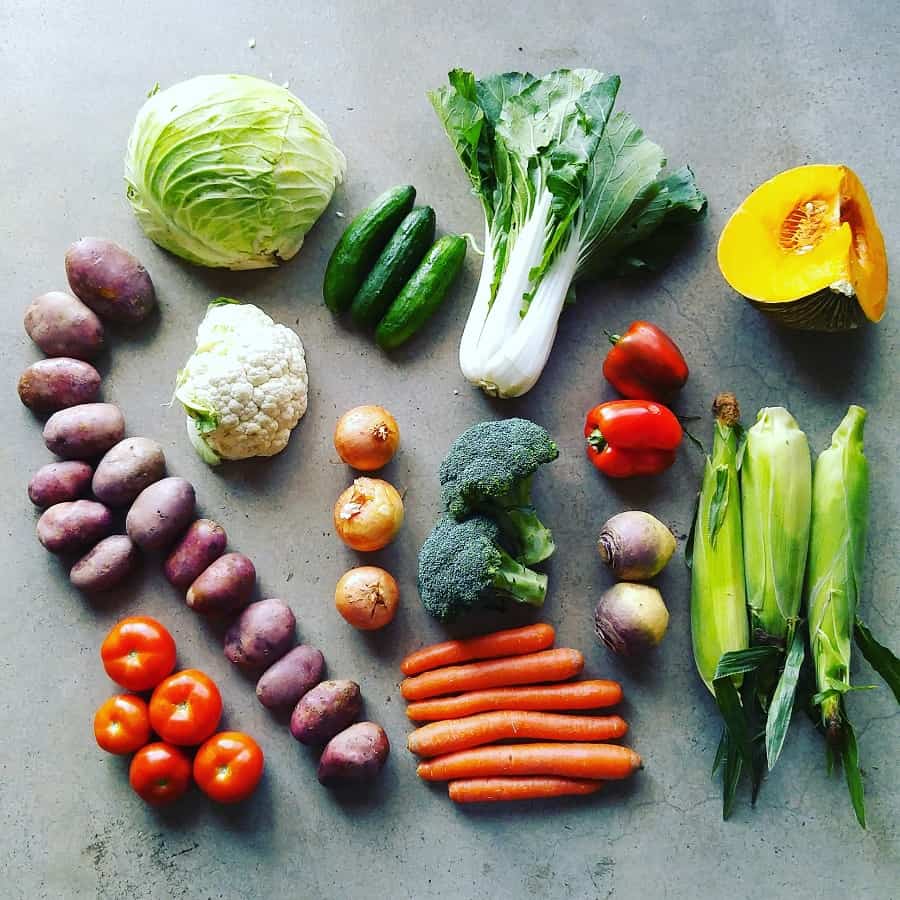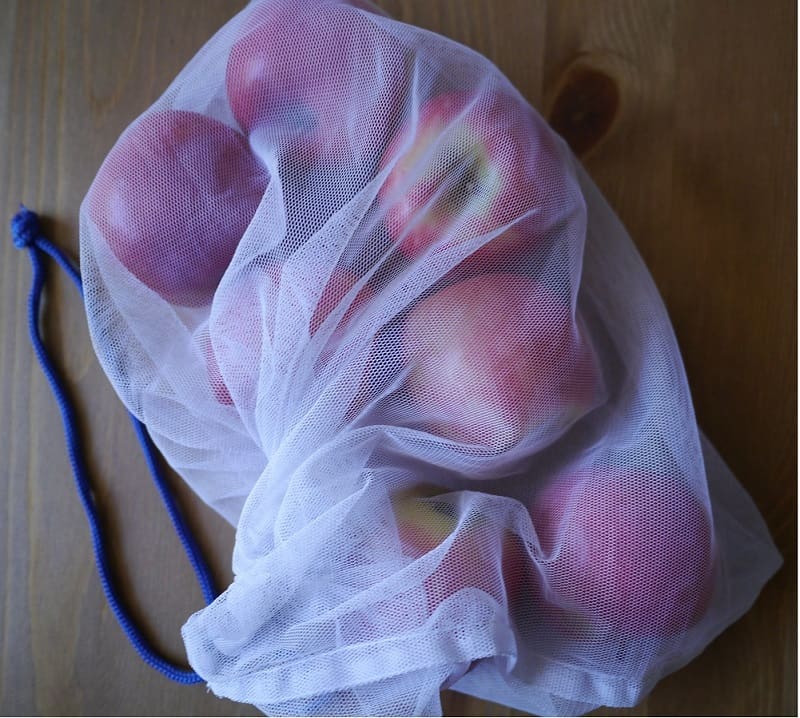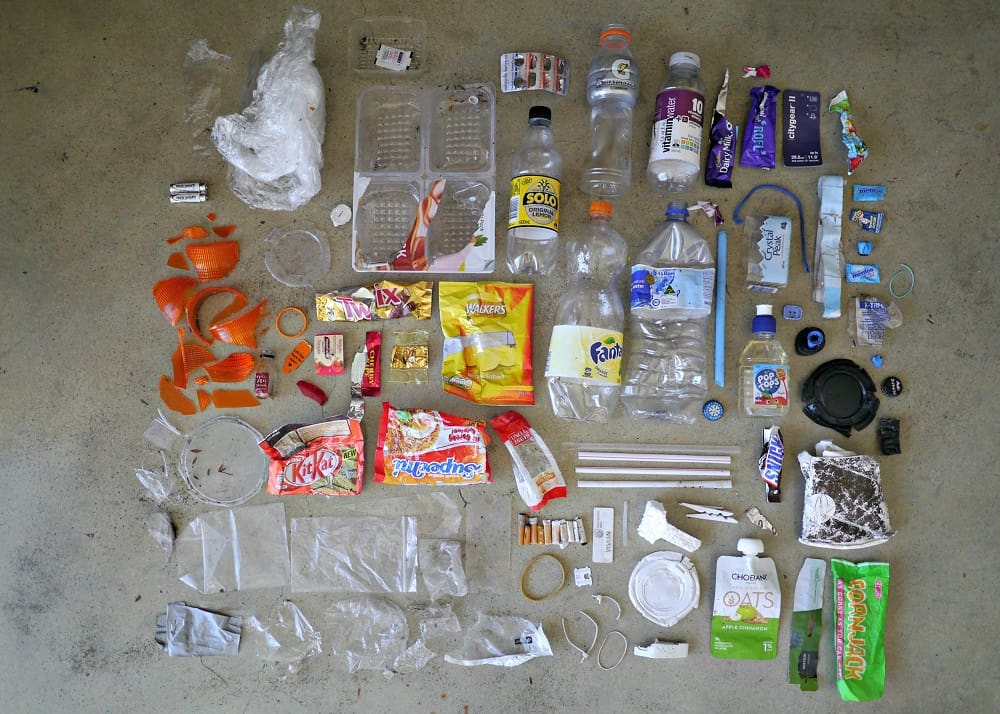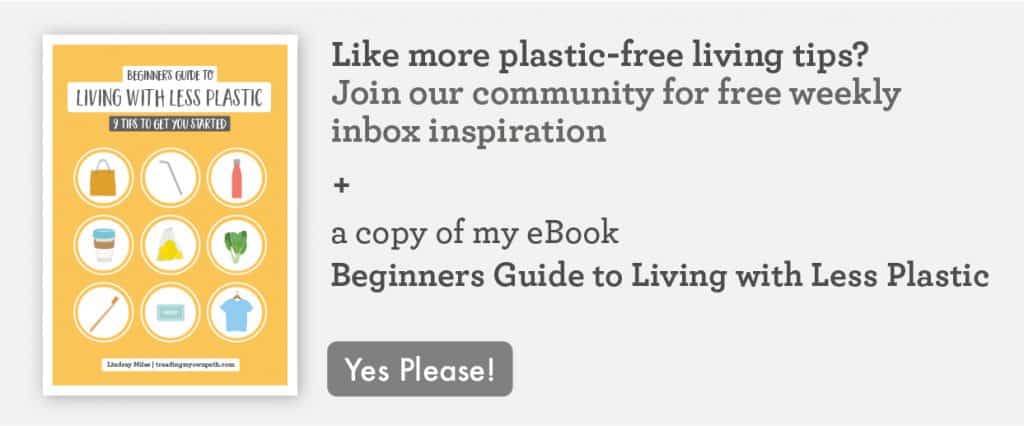Can You Have A Dog and be Zero Waste?
My husband and I have been wondering about adopting a dog for a long while. The shelters are full of unwanted animals, and we felt that we now have the energy, time and space to give one a loving home. Having never had a dog before (the only pet I had as a kid was a hamster) I wasn’t sure what the reality would be.
How do you prepare for something you’ve never done before, and make such a commitment?
Then we came across greyhound fostering and adoption. Despite greyhound racing being banned in many countries across the world, it is very much happening in Australia (New South Wales announced recently that they will be banning it – it is being appealed, of course). Greyhounds are overbred to increase the selection pool, and bred solely to run fast. Those that aren’t fast enough, or won’t chase, are disposed of. In fact, 17,000 healthy dogs are killed ever year in Australia.
Greyhound rescue charities exist to try to take some of these dogs and rehome them. Some more conscientious trainers will arrange for charities to take unwanted dogs; other times it is the vets that pass these dogs on to spare them. These rescue organisations don’t have kennels of their own so the dogs go straight from the racing kennels to foster families.
Sometimes there is less than 24 hours notice that a dog will be needing a new home.
My husband and I decided that fostering a greyhound might be a good way to see if our home and our lifestyle is suitable for a dog. We have a small fenced-in yard that wouldn’t suit a lot of dogs, but greyhounds (surprisingly) don’t need much space. They need walking, of course, but 30 minutes a day is adequate. They are indoor dogs as they feel the cold.
They are different to other rescue dogs in that they are used to human contact and other dogs (although, only other greyhounds). They are gentle, calm and unfazed by most things, plus they are toilet-trained.
It happened really fast. We called to say we’d installed a gate so our yard was secure, but we still had a few things to source – like a bed, food bowls and food. The next thing was, they called to say they had a dog and we could expect him the next day. I’m sure you can never be totally prepared, but my, did I feel woefully underprepared!
Hans arrived at 6pm last Tuesday. He’s 3 and a half, so we think he’s been racing for 18 months. We don’t know much else about him. He’s calm, placid and settled in quickly.
Of course, I want to keep things as waste-free as I can. But is it possible?
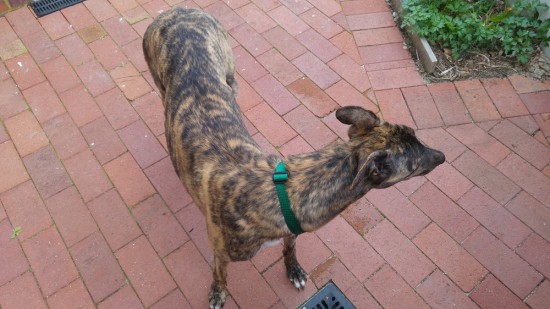
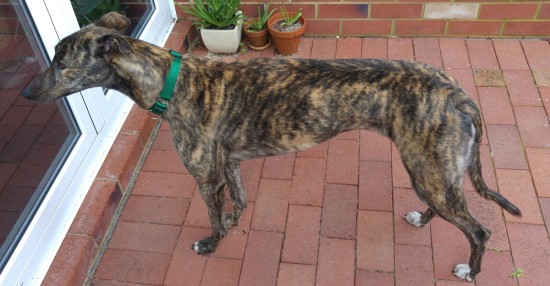
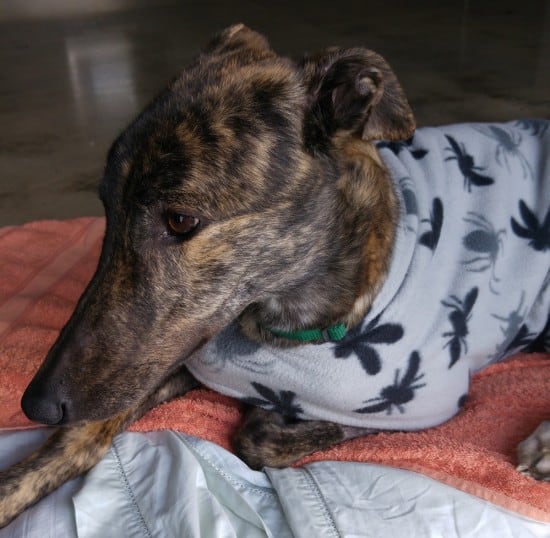
Is it possible to have a dog and be zero waste?
Bedding, Bowls and Toys
Zero waste and plastic-free living is important to me. I’ve spent the last 4 years living like this, and I can’t just undo it or not think about it. Even the idea of buying things new really stresses me out, let alone wrapped in or made from plastic.
We’d hoped to source the food bowls second-hand and use a second-hand cot mattress for the bed, but there were none on Gumtree at the time and with less than a day to find something, we had to buy new. We found 100% stainless steel bowls (one water, one food) and a mattress covered with hessian, which I could replace with upcycled hessian coffee bags if need be (our local cafe sell their old ones).
We’re using old bedding on the mattress to extend its life – the bedding is washable, whereas the mattress isn’t. Fortunately none of these things came with extra packaging.
We found a toy made from 100% rubber, but all the soft toys were polyester. It is possible to buy natural ones on the internet, but after being given a soft toy by a colleague we’ve discovered that any soft toy will not be worth the investment – it will be gone in 5 minutes! Greyhounds don’t really play, so we’re not too worried.
Dealing with Dog Poo
I built a dog poo worm farm in the back yard using a white “builder’s bucket” donated to me by my local bulk food store (it previously had washing powder in it). Worms will eat dog poo provided there is no other food in there.
I won’t be adding the castings to my veggies but it will break down into nutrients and go back into the soil – better than the bin. It’s safe to do, and I have plenty of friends with dogs that do this. (Here are the instructions if you’re interested in how to make a DIY dog poo worm farm – I realise it’s a niche area!)
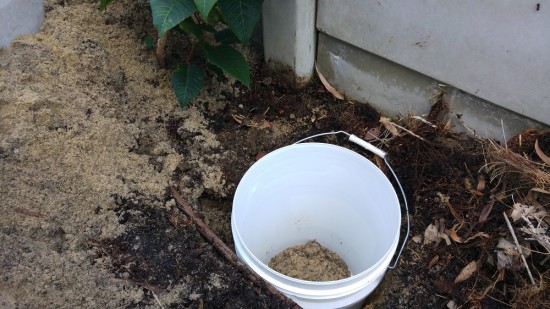
White “builder’s bucket” with the bottom cut out, dug into the ground with 2 inches showing on top.
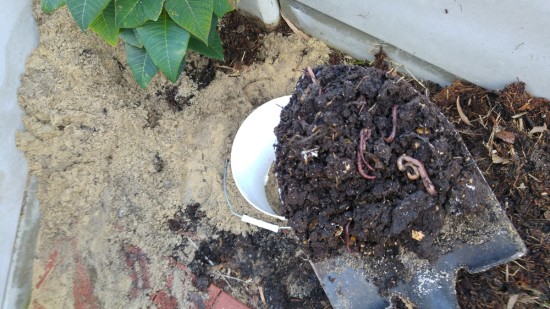
Adding worms, and shredded paper to the dog poo worm farm.
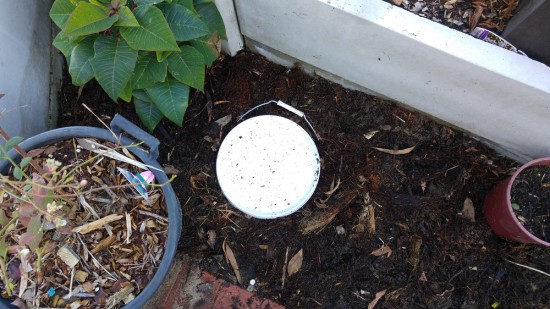
The finished dog poo worm farm. If I could be bothered I could paint the lid – I could even stand a plant on top. It could be very discrete : )
I pick up the waste with newspaper. If we’re out and about I can put in dog poo bins – there are a couple close by – and we are lucky that the domestic waste in our suburb actually gets put through an industrial composter.
In fact, as Hans had worming tablets when he came, I can’t use the worm farm for two weeks, so I’ve been putting it here. No, I’m not keeping it for my waste jar!
Food and Treats
The lady that placed Hans with us brought dog food with her, so it was one less thing to worry about. At least, it should have been. But I’ve realised that as someone who doesn’t buy meat because I don’t want to support industrial agriculture, I’m going to struggle with this.
I’m also going to struggle with the packaging, and the “processed” nature of dog food.
Kangaroo meat is a possibility here as it isn’t farmed, it’s wild. But do I want to cook and handle it myself? I’m aware that dogs have thrived on vegetarian and vegan diets but it takes sound management and doesn’t work for all of them. Racing dogs are often fed cereal (cornflakes and Weetabix) with milk for breakfast, and pasta for dinner -greyhounds will eat most things. But should they?
They need a complete food, and to be healthy. A local bulk store is looking into stocking dog kibble – it will contain meat but there will be no packaging. Lots of options, but none are perfect.
I don’t have the answer, but I have enough kibble here to spend some time looking into this further.
The Stuff I Didn’t Think About
After three sleepless nights, we learned that leaving the light and radio on overnight is necessary to maintain calm. I am someone who never leaves unnecessary lights on! Whilst I know that it’s negligible in terms of waste, it still stresses me a little, and it’s another adjustment I have to make.
I also didn’t expect to be thrown into a whole new world. The last week has been eye-opening, stressful…and emotional. I’m not talking about my lifestyle now, I’m talking about the world of greyhounds, and greyhound rescuers. To have met so many people who are completely dedicated to saving these beautiful animals has been humbling.
They open up their homes and give up their weekends to try to find forever homes for these dogs.
They are all volunteers. They are doing everything in their power to save as many animals as they can.
Whatever my personal dilemmas are about waste, ethical living and sustainability, clearly none of this is Hans’, or any other greyhounds’ fault. They are part of a broken system that breeds dogs simply to make money and provide entertainment for a few, and then discards them when they no longer perform.
I’d never really given greyhound racing much thought before, but having seen and read what I have in the last ten days, I’m appalled. For all the dogs that are rescued, many more won’t be. In Australia, it’s estimated 50% of dogs are destroyed. I hope that the NSW greyhound racing ban remains, and that it is the start of the end for racing dogs in Australia.
Stuff shouldn’t be wasted. Resources shouldn’t be wasted. Lives shouldn’t be wasted, either.
Now I’d love to hear from you! Have you ever fostered or rescued a dog before? What was your experience? Do you have any tips to share? Are you trying to live plastic-free or zero waste with a pet, and what have your successes been? What about your dilemmas and struggles? Are you vegetarian or vegan with a pet, and how have you made your choices regarding the food you give them? Did you know about the reality of the greyhound racing industry before, or was it something that you never considered? Please tell me your thoughts in the comments below!
[leadpages_leadbox leadbox_id=1429a0746639c5] [/leadpages_leadbox]

